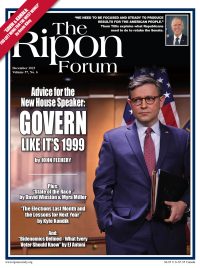
The 2024 campaign is heating up, with many polls showing President Biden in trouble. Democrats are worried but say they have time to turn things around. The challenge for the White House is changing the dynamic of the race to move numbers. So far, this has been unsuccessful.
Recent surveys show Republican candidates both leading and trailing Biden, with many of them within the margin of error. An NBC News poll showed Trump leading Biden by 2 (46-44). However, The New York Times/Siena poll of six battleground states showed a generic Republican candidate winning all six states by double-digit margins, and Trump winning the cumulative six states by four points, DeSantis winning by 1, and Haley by 8. Of the Republican field, Nikki Haley has been unique in that more than one survey has shown her appealing to independents. In the cumulative states, she led among independents by 15, with DeSantis winning by 2, and Trump by 1.
One of the important dynamics for 2024 is that if the current primary frontrunners, Biden and Trump, have a rematch, both would go into the campaign with negative brand images. From our research for Winning the Issues (October 18-19, 1000 registered voters), Biden’s brand image stands at 40-56 favorable-unfavorable, Trump at 37-60. Independents’ view of the two candidates is even worse, at 33-60 for Biden at 32-65 for Trump.
One of the important dynamics for 2024 is that if the current primary frontrunners, Biden and Trump, have a rematch, both would go into the campaign with negative brand images.
Voter dissatisfaction also extends to the two parties. Brand images of Congressional Republicans are 34-60, and Democrats at 41-53. Among independents, unfavorables for both parties are over 60 percent (23-68 for Congressional Republicans, 29-61 for Congressional Democrats). Forty-four percent of independents are unfavorable to both.
This environment has introduced the prospect of a third party ticket. From the 2020 exit polls, 26 percent of the electorate considered themselves conservative Republican and 17 percent liberal Democrats, with 57 percent being everyone else. With the large percentage of the electorate not affiliated with the party bases, the numbers are there to construct such an effort. We have not yet seen an effective effort to mobilize enough voters into a third party, as this would have to be based on an issue or policy direction rather than on personalities alone.
We are frequently asked to make predictions about who will win next year. Rather than predicting who will win, there are two criteria we believe will determine the winner in 2024.
First: who has an effective strategy for independents?
After winning independents for 10 consecutive elections when a Democrat occupied the White House, this time, Republicans lost this group by 2. This happened despite a remarkable party ID advantage for Republicans (+3 R), the largest margin for Republicans in the history of exit polling. For a successful election next year, Republicans must address independents.
Former President Trump won independents by 4 in 2016, and President Biden won them by 13 in 2020. The last major party candidate to lose independents by a larger margin than Trump was Walter Mondale in 1984. Given the role this key group plays in determining election outcomes, success with independents will be one of the most critical challenges facing Republicans.

Trump won independents by 4 in 2016, and President Biden won them by 13 in 2020. The last major party candidate to lose independents by a larger margin than Trump was Walter Mondale in 1984.
Second, who wins the economic narrative?
The White House seems perplexed as to why Biden struggles on the economy. His economic job approval is underwater at 35-57, with his economic policies seen as incorrect (51 percent) rather than correct (30 percent).
Our research shows Republicans hold sizable advantages on the economy (+10) and inflation (+12). But as we saw in 2022, Republican leads on economic issues don’t automatically translate into votes for Republicans. In the 2022 Edison exit poll, independents identified inflation as their top issue, and 79 percent of independents thought the economy was “not so good” or poor.
Republicans had a clear advantage as independents preferred Republicans to handle inflation by an 11-point margin, 52-41. But among the 41 percent of Independents who said the economy was “not so good,” they voted for Democrats by a 29-point margin, 62-33. While Republicans had an 11-point advantage on the top issue for independents, they lost them by 2 points, a swing of 13 points. This was a missed opportunity for Republicans, indicating that independents needed to hear a more substantive economic message from Republicans.
Abortion is a difficult issue for many Republicans. Its impact will vary depending on the district and candidate position, and it is unclear how this will play in context of other issues. However, the strongest positioning for Republicans will be around the economy, a Republican strength and a weakness for President Biden. This means not just criticizing Biden policies, with which there is clear dissatisfaction, but offering alternative solutions — what Republicans would do. Opportunities are there if Republicans can effectively take advantage of them.
David Winston is the President of The Winston Group, a Washington, D.C., strategic planning and survey research firm. Myra Miller is the firm’s Co-Founder.




